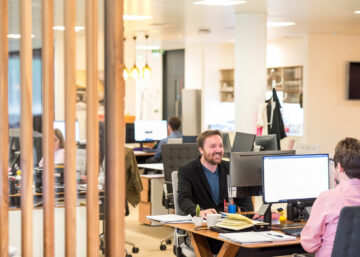Many organisations want to be at the forefront of technology, apply it to employer branding, workplace environment, talent retention and to the entire organisation. To achieve this, it is important to remember that people are the priority.
It is often believed that organisational culture is composed of its principles and values, which can be taught and learned by heart and then “recited” throughout one’s professional life within the institution. However, culture is much more than that. Global Development and Innovation Manager at PDA International, Cecilia del Valle, affirms that culture is founded on things that may seem small but, at the end of the day, make a difference: “who has the best office, how achievement is rewarded, where the managers eat, what the budget is used for, how the organisation acts in times of economic crisis, how and who makes decisions, how to work in teams, etc.”
Since everything comes down to the relationship that is fostered from and within companies, can technology be linked to organisational culture? According to Cecilia del Valle, both are highly related, but we must not lose sight of the most important thing, which should always be the employee. Technology is a key variable and although almost no organisation is outside the digital transformation nowadays, no progress can be made if people are not contemplated.
“Technology and culture must evolve together. We saw many companies that, driven by digital transformation, are committed to implementing new technologies, but overlook organisational culture. So now they start to realise that not all the expectations placed on technology have been fulfilled,” says the expert in organisational culture.
In a world where the only constant is change, it is vital to remember that, to achieve organisational goals, everything depends on talent. Above all, in the case of technology and digitalisation, because those who will drive the transformation process will be human beings. This is why culture should accompany all this by promoting processes linked to innovation and agility.
Just like the organisational environment can be managed, so can the culture of a company. It is important to think that it has the ability to enable the attainment of a goal or quite the opposite, hinder it. Knowing the starting point is essential to know which path should be taken to attain those goals. Culture assessments provide just the right amount of information so that, as Peter Drucker said, it is possible to prevent (the culture) from eating “the strategy for breakfast.” Just as technology needs to evolve with culture, so must strategy.
In the interview, Cecilia del Valle explained that the organisational culture questionnaire prepared by PDA International has the differential of Carolyn Taylor’s theory integrated into the behavioural theory of the PDA Assessment: “It shares the systemic view about organisational culture and is close to PDA as regards its behavioural approach. Unlike other theories that study organisational culture, which are based on more abstract conceptualisations, Taylor analyses specific behaviours, systems and symbols within organisations.”
The differential of this kind of approach allows complementing diverse techniques and delving into the knowledge of the organisational cultures in order to overcome the different challenges that arise without losing sight of the essence of the culture and the well-being of the employees.




